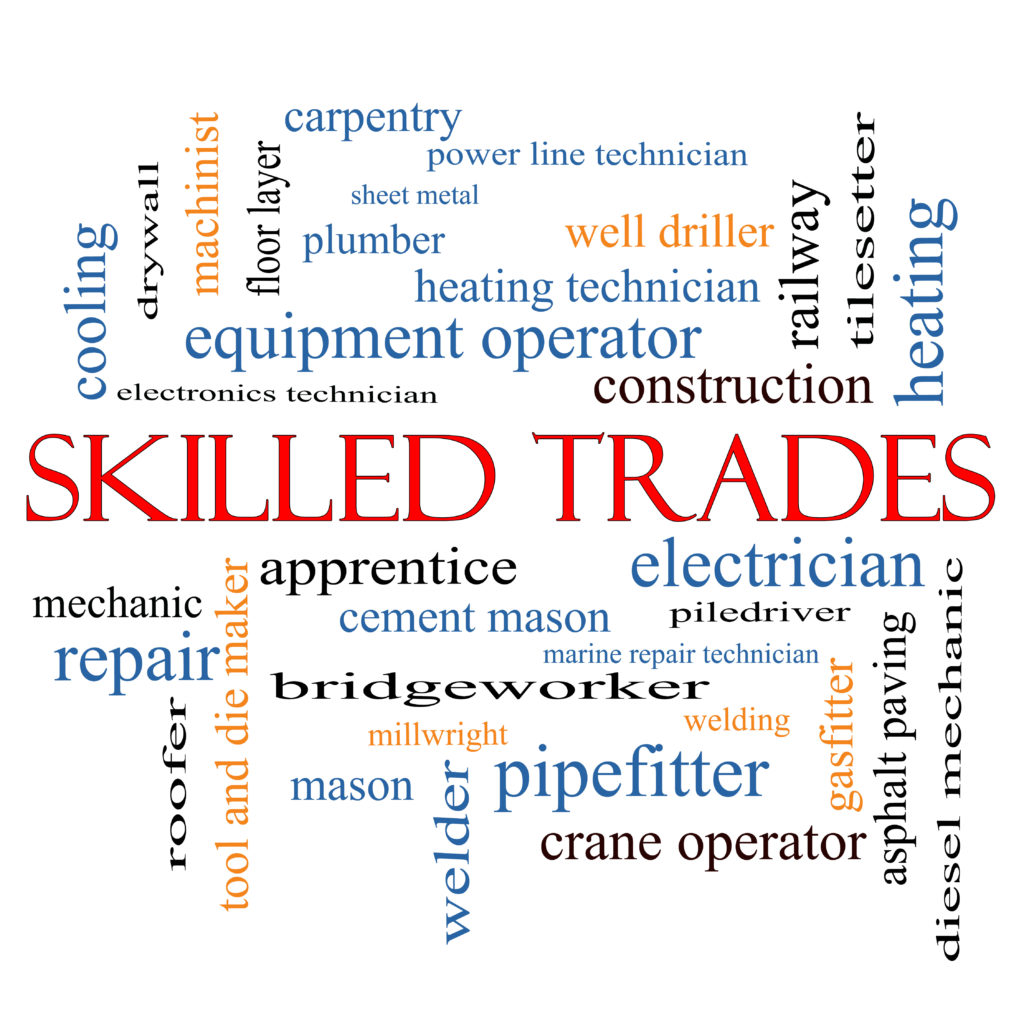How to Get into the Trades

Mastering a skilled trade can often be the beginning of a fruitful career. Those who work in trade jobs not only get to be active, creative, and work with their hands each day, but they also get to make a difference in the lives of home and business owners. Plus, there is always demand for skilled trade professions, meaning a trade career can offer longevity.
But where’s the best place to begin your trade career? For that matter, how do you know which trade career is the best fit for you? We’ll answer these questions in the post that follows.
Specifically, this post will explore the following topics.
- What trades are easiest to get into?
- What are the best paying trade jobs?
- What is the best path for becoming a tradesman?
- What about getting a license?
Let’s get into some of the specifics of what’s involved with starting a trade career.
1) What trades are easiest to get into?

If you think that describes your situation, then a career in the trades is the perfect choice for you. Unlike common misconceptions about the trades, it will provide you with consistent opportunities. There is job security and the chance to earn while you gain a skilled qualification.
While all skilled labor professions are noble, some may offer higher thresholds of entry than others. The question is, what are some of the skilled trades that are easiest to get into?
According to an article from GlassDoor.com, there are a few career options that offer high demand and minimal educational requirements. For many aspiring tradesmen, these may be options worth considering:
Wind Turbine Technicians
Let’s navigate through the
Wind power is one of the fastest-growing industries in the United States. By choosing this skilled trade career, you can contribute to a green economy and also be part of a truly robust workforce.
The even better news is that the requirements for entering this field are fairly light. Work as a wind turbine technician typically calls for a couple of years in a technical school, and somewhere around one year of on-the-job training.
Electricians
Another option to consider is beginning a career as an electrician. Home and business owners consistently need electrical professionals to keep their property safe and effective.
This is another career field with a lot of opportunity, and also a relatively low threshold of entry. Most electricians master their trade simply by spending four or five years working a paid internship.
Elevator Mechanics
Believe it or not, this represents one of the most lucrative of all the skilled trades. And, it offers a lot of career opportunity. Simply put, there is always a need for technicians to install, repair, and maintain elevators and escalators.
As with electricians, elevator mechanics can learn their trade through a paid internship. This will usually last somewhere between four and five years.
Industrial Maintenance Mechanics
An industrial maintenance mechanic is someone who installs, repairs, and maintains the equipment used in factories and other industrial settings. There is a big need for skilled professionals who work in this field.
There is no apprenticeship required for this role. Instead, industrial maintenance mechanics typically learn their trade through on-the-job training. This training will likely last about a year.
HVAC Technicians
All of us want to stay cool in the dog days of summer, and warm during the frigid winter season. HVAC technicians help us do exactly that, providing the maintenance needs for heating and cooling systems. As such, these professionals are always in high demand.
If you’d like to be one of the people who work to keep HVAC machines fully functional, you can do so either via an apprenticeship or by enrolling in a trade school. Mastering this trade can take anywhere from six months to two years.
2) What are the best paying trade jobs?

Now that we’ve covered the trade jobs that are easiest to join, a related consideration is salary. What are the skilled trade professionals that tend to offer the best pay?
A recent article from Indeed.com shared information on some of the highest-paying trades. Here is a summary of some of the top options.
HVAC Technicians
We’ve already mentioned that professionals who install, repair, and maintain heating and cooling systems are in high demand. It makes sense, then, that they also tend to get decent pay. According to Indeed, the average national rate for an HVAC professional is $23.20 per hour.
Plumbers
Another great option for tradesmen looking to make some decent money is to seek a career in plumbing. Plumbers, of course, work to install, repair, and maintain both water and gas lines. The average national salary for plumbers is $25.37 per hour.
Electricians
Electricians make the list once again. According to Indeed’s salary information, the average national rate for electricians is $25.61 on an hourly basis.
Boilermakers
A boilermaker is a skilled trade professional who assembles boilers, vats, and tanks. These vessels are then used to store or transport oil and other chemicals. It is something of a niche job, but also a high-paying one, offering an average national salary of $31.22 hourly.
Construction Managers
One additional option to consider is becoming a construction manager. This is a more arduous path that may require added time and a higher level of education than some of the other skilled trades we’ve mentioned here. With that said, it is a good, high-paying job, with an average annual salary of $75,386.
As you think about how to get a trade career off the ground, these are just some of the options that are worth having on your radar.
3) What is the best path for becoming a tradesman?

Choosing between the different skilled labor jobs is just the first step down your path to becoming a tradesman. As for specific steps you can take to land an apprenticeship, a job, and ultimately a career where you’ll get paid well, here is a basic path to consider.
Practice Your Skills at Home
Before you go out and apply for a technical school or an apprenticeship program, keep in mind that a lot of the skills you’ll need can be learned at home. If you want to become a plumber, try your hand at some increasingly complex home plumbing projects. If you want to become a carpenter, buy some wood, get some tools, and start honing your abilities.
Of course, it’s important to put safety first as you master your skills. Learn about some of the basic precautions needed to avoid accident and injury. This is especially critical for any kind of electrical work, where electrocution is a very real possibility.
Also note that you can learn a lot just by doing some online research. YouTube isn’t enough to prepare you for a skilled trade, but it can at least help you master some of the basics. A little home-based education will really help you prepare yourself to thrive in any paid apprenticeships or college degree programs you pursue.
Finish High School
Before you can land an apprenticeship or a job in any trade environment, you’ll want to make sure you get a high school diploma. Getting a GED is also fine. Simply put, there aren’t many jobs available to you if you don’t get this baseline of school experience.
Additionally, we’d recommend studying for, and eventually taking, either the SAT or ACT. No, you won’t necessarily need these tests to get a place in school. However, your test scores, especially math and science, may be considered as you look at trade schools or paid apprenticeships.
Go to Technical School or Community College
After you finish high school (or a GED), you may wish to search for a trade school or community college in your area. Not all trades will require you to attend a formal education program, but enrollment in such a program can certainly help.
A community college will offer you the chance to get a degree in two years’ time, as opposed to the more traditional four. You can take classes related to your chosen field, as well as some other core curriculum classes to ensure you have a broad educational background.
A trade school won’t offer you a college degree. Instead, you’ll get a certificate, which will be totally focused on your chosen trade. A lot of the trade professions you consider will be fine to take a certificate over a degree, and doing so can be faster and more affordable. In the end, though, it depends on your specific goals.
Again, you don’t necessarily need to go to school in order to hone the right skills, but doing so may give you a competitive advantage over the other people applying for the same apprenticeships.
Search for an Apprenticeship
As for how to move on to day-to-day practice of your trade, you’ll likely want to seek an apprenticeship program. There are usually a lot of paid apprenticeship positions available through the local trade unions. You may also be able to find an apprenticeship program that’s run by a local contractor or employer.
An apprenticeship will often be a formal requirement for launching your trade career. Even if it isn’t, a program that lets you serve as an apprentice to a more seasoned tradesmen will provide an invaluable space for honing your technical skills.
Apprenticeship programs can vary from one profession the the next, but in most cases, you can expect it to encompass four or five years of on-the-job training. There is often some ongoing classroom work required, as well. Usually, the classroom program will focus on making sure you’re up to date on local codes and regulations that relate to your trade.
The bottom line: As you seek to learn a trade, and receive some pay for it, an apprentice program can be truly invaluable. It is definitely worth it to search for such a program in your area.
Become a Journeyman
Once you complete your program as an apprentice, you can move on and become a journeyman. This means you have completed not only the on-the-job training required, but also passed some examinations. A journeyman is someone who can apply their trade under their own license; in other words, you don’t have to work under the license of a master tradesman.
Following a few years of work as a journeyman, you can then apply to become a master of your trade. (You may need to work as a journeyman for anywhere from three to six years; again, it varies from one trade to the next.) Becoming a master will require some additional work in the classroom, where you’ll learn even more about your trade. More testing may also be required.
Becoming a master will open a lot of doors for you. For one, the pay is more! And for two, a master can work in supervisory roles over other people, including apprentices who are just learning the trade.
Finally, note that when you learn enough to become a master, you will also be in a good position to open your own trade business, should you choose to do so. (And for those wondering how to make the best possible money in their labor job, becoming an entrepreneur is definitely one good path forward.)
For those wondering how to find success in their trade, this is meant to offer a very basic path forward. Be advised that the specific journey can look a little different from one trade to the next.
4) What about getting a license?

A final consideration is how to go about getting the license you need to practice your trade. Again, this is something that varies between different trades.
Generally speaking, you’ll be able to sit for a license exam upon the completion of a certain number of work hours. Some trade licenses will also require classroom time. The best way to prove you have the right number of hours is to submit an affidavit from the master under whom you learn your trade.
Most license exams focus on things like local building codes, ordinances, and regulations. Hopefully, you’ll learn all of this during the course of apprenticing.
After you receive the license you need to practice your trade, another important step is to get certification marks. This allows you to advertise that you’re allowed to practice your trade, and that you are licensed as a skilled professional. When it comes to how to build a business for yourself, this is a critical step.
And speaking of how to build a business, it’s also important to get yourself listed in local trade directories. This is how a lot of trade professionals find the job opportunities they need.
For more information about how to get your marks, or start lining up those job opportunities, please reach out to us at your next opportunity.
